CEO and Founder of former UT bank, Prince Kofi Amoabeng, has raised concern about the role of the International Monetary Fund (IMF) in the closure of his bank (UT Bank) and the manner in which the process was handled.
According to him, although he suspected that the IMF had a hand in the closure of the bank, he was quite unsure if the Bank of Ghana’s decisions were unduly influenced by external pressures.
Speaking in an interview on an Accra based TV station he said, “I had my suspicions that the IMF had a role to play in it, but I couldn’t confirm it. So if you ask me, I believe in what the governor said, that the IMF influenced the program”.
“But then, it’s a sad statement for him to make because it means the leadership in Africa doesn’t have the independence and the will to do what is right for their country, and they have to be dictated to”.
Kofi Amoabeng questioned the alleged involvement of the IMF, highlighting concerns about the controversial and dramatic process used to close UT Bank.
“So, you want to take IMF orders to close local banks. Did the IMF ask them to close UT Bank at 6 a.m. with Bank of Ghana officials and the police in Rambo-style to go and remove the signage? Was that precision by the IMF? So, who did that?”
“Did the IMF tell them that they should also attack the other UT companies, to collapse the whole UT group? Because that’s what they did. They closed the accounts of all UT companies, including UT Holdings. Did the IMF tell them to go after the founder who had resigned 20 months before the closure?” he asked.
Kofi Amoabeng indicated that, the closure of his bank shows the need for strong leadership and safeguarding independence in Ghana’s financial governance.
“What is said is very shallow on the surface. It only exposes the governor’s position, and of course, it shows that the economy is very weak, and we have leaders who just take in anything that is ordered from the imperialists or the developing partnerships, so to speak” he said.




















